
Finest Hour 190
Churchill’s Literary World

February 12, 2021
Finest Hour 190, Fourth Quarter 2020
Page 04
By David Freeman, September 2020
“I have always made my living by my pen,” Winston Churchill liked to remind people. Indeed, he had to do something. By the 1930s, Churchill’s parliamentary pay was less than he spent each year on champagne alone! He needed a pen mightier than the Board of Inland Revenue.
We begin this look at Churchill’s literary world, however, not with his own writing career but with the mightiest written project about his life. Work on the official biography started nearly sixty years ago, when Churchill chose his son Randolph to head the project. Two authors, three editors, and four different publishers later, the work is now complete. Richard M. Langworth, the founding editor of Finest Hour, tells us something of the history of the great work and of his own personal involvement.
The final volume of documents in the official biography runs to more than 2,500 pages. Fittingly, Kevin Ruane tells us in 2,500 words about the treasures it contains and shows that, contrary to an oft-repeated claim, Churchill’s post-war premiership was no mere postscript. A quartet of experienced biographers, Robin Brodhurst, John Campbell, Kenneth O. Morgan, and Anne Sebba, reviews for us four other important new books connected with Churchill and his times.
When the young British author named Winston Churchill met the young American author named Winston Churchill, it was the American who was much better known to the reading public. Ronald I. Cohen and Lawrence Siskind tell us about the details and legal significance of this brief but memorable relationship.

2024 International Churchill Conference
By the time the British Winston was outpacing the American, he was already the subject of two biographies by the same author. David Stafford introduces us to Alexander MacCallum Scott and inter alia continues the exploration of Churchill’s many associations with Scotland that we started in our previous issue.
Churchill’s writing career culminated in his receiving the Nobel Prize for Literature in 1953 (see FH 178). Jonathan Rose explains how Churchill’s writing was also great theater. In addition to being a great writer, however, Churchill was also a great reader, and so we finish with a look at some of his favorite authors.
Subscribe
WANT MORE?
Get the Churchill Bulletin delivered to your inbox once a month.




